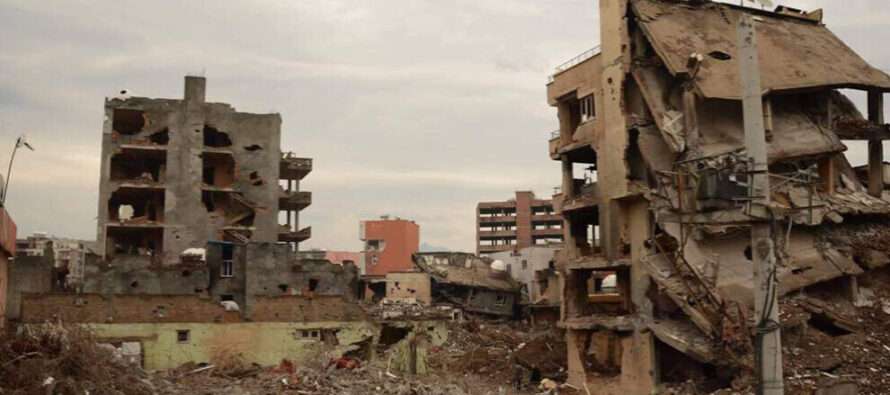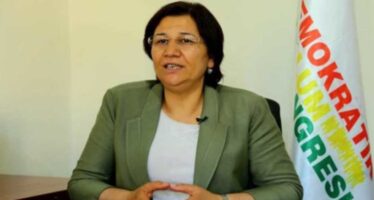On February 7, 2016, at least 177 people were burned alive or shot by the Turkish military in what became known as the “death basements of Cizre”. Five years later, impunity continues and denies the victims justice.
The “death basements of Cizre” is an expression the stands for a series of massacres that the Turkish military carried out on February 7, 2016 in the northern Kurdish city of Cizre – in residential buildings in which a number of people sought protection from the war crimes of the Turkish state during the military siege imposed on the city. Five years on, the judiciary has not done justice to the victims.
According to reports by human rights organizations, at least 177 people were burned or shot alive by security forces in the “death basements of Cizre”. In total, at least 288 people died. While those seeking shelter in some basements were burned when the military poured gasoline in them, Turkish troops stormed other basements and shot those present before they burned them. The bodies of 14 people killed in the basements are still missing. They are Feride Yıldız, Mardin Çelebi, Hacer Aslan, Osman Gökhan, Hüseyin Derviş, Servet Aslan, İdris Susin, Ali Aslan, Cemal Pürlek, Emrah Aşkan, Osman Esmeray, Mustafa Keçanlu, Emrah Aşkın and Sakanş. Seven of them are said to have been buried in cemeteries in other cities.
The first curfew imposed on Cizre
On September 4, 2015, the Turkish government imposed a curfew on the city of Cizre in Şırnak. It was the first of a long series of curfews that continues today. During this first curfew, the Turkish state attacked the city for nine days with a huge display of forces, armed to the teeth with conventional weapons. A group of people opposed them at that time. The nine-day attack on Cizre resulted in 21 dead, dozens injured and hundreds of houses and apartments destroyed.
The second curfew imposed on Cizre
On December 14, 2015, the second curfew was imposed on the then 115,000 people-strong city. For 79 days, the Turkish army bombed Cizre both from the air and the ground. The police and the military took entire neighbourhoods under fire, destroyed the telephone, electricity and water supplies and besieged thousands of people. Residents who sought shelter from the attacks in the basements of their homes were cruelly murdered. During these 79 days, at least 259 other people were killed by Turkish security forces. Because of this brutal violence against the injured, who had taken shelter in the basements of the buildings, the Kurdish people who had the memory of what happened crystal clear in their minds, called the basements the “basements of horror”. The bodies of a total of 177 people, including 25 children, were recovered from the rubble in the Cûdî and Sûr districts. In three basements alone, 31, 62 and 50 people were killed.
110,000 people displaced
The worst damage was done in the districts of Cûdî, Yafes, Sûr and Nûr. 80 percent of the neighbourhoods were razed to the ground. 500 buildings were completely destroyed and 2,000 houses were badly damaged. After 20 days, 110,000 people were forcibly evicted from the city. Thereupon the destruction was extended, 500 more houses were demolished by the state building authority TOKI. The winding old buildings were destroyed and 6,500 apartments were built in prefabricated buildings controlled by the military.
Investigations into 121 deaths delayed
Although five years have passed, there is still no progress in the investigation into the deaths of 121 people. 83 of the proceedings were closed. Of these 83, 51 cases were brought before the Constitutional Court. Another four proceedings were frozen and a decision on “non-jurisdiction” was given in 34 proceedings.
Norman Paech: What happened in Cizre were war crimes
Hamburg international law expert Prof. Dr. Norman Paech describes the events in Cizre and other regions, which were besieged by the Turkish military in 2015/2016, as a “war against the population”. Paech classified the massacres as war crimes and crimes against humanity. But since Turkey has not ratified a large number of internationally binding agreements, it cannot be brought before the International Criminal Court for the attacks and massacres, which clearly constitute a war crime and a crime against humanity. Only if the UN Security Council so requests, an indictment against those responsible from the Turkish government would be possible. This, however, depends on legal and political reasons as well as the attitude of the United Nations.
ECHR dismisses complaint
In February 2019, the European Court of Human Rights (ECHR) dismissed a lawsuit against the Turkish state regarding violations of the law by Turkish security forces during the curfew in Cizre. The decision was justified with the so-called non-jurisdiction. The Strasbourg judges did not deal with the content of the lawsuit and decided that national legal recourse must be exhausted first. There are still two lawsuits pending before the Constitutional Court and these must be resolved before the ECHR can deal with the case.
The proceedings before the ECHR concerned the cases of Ömer Elçi and Orhan Tunç. Orhan Tunç was shot and injured by security forces in Cizre and fled into a basement. His brother, the co-chair of the People’s Council of Cizre, Mehmet Tunç, initiated a lawsuit at the ECHR and obtained an urgent decision according to which the Turkish state must use all its means to protect the right to life and physical integrity. The Ankara government ignored the decision and let the man die. Mehmet Tunç died a few days later, also in February 2016.
The motions on behalf of Ömer Elçi and Orhan Tunç had been selected by the ECHR as a pilot process from 35 motions. However, the European Court of Human Rights decided against a model decision for Turkey and persisted in saying the national legal process must be exhausted first. And that, although in Turkey one can no longer speak of a functioning constitutional state.





